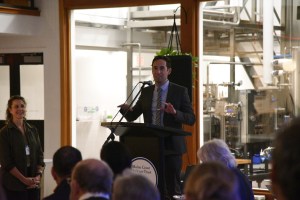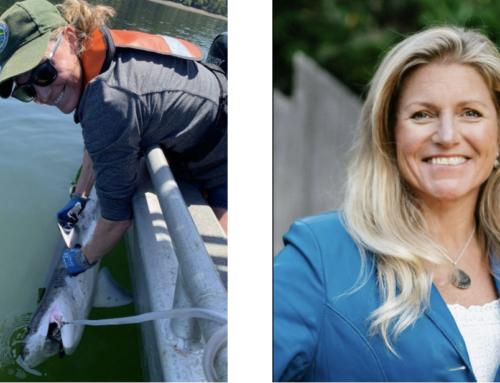Maine Coast Heritage Trust raises funds to boost climate awareness
March 31, 2025
The second annual Tides of Change fundraiser brought hundreds of people from across southern Maine to Freeport to support Maine Coast Heritage Trust’s (MCHT) efforts to mitigate the damaging effects of climate change.
Kate Stookey, president and CEO of MCHT, said the Tides of Change fundraiser brought in over $92,000, surpassing last year’s event, which pulled in about $75,000.
Fundraisers like Tides of Change bring awareness to MCHT’s work, such as conserving Maine’s coastlines and natural areas with programs such as The Rivers Initiative and The Marshes for Tomorrow Initiative and efforts to secure land for conservation through its Land Trust Program.
“We do get grants and donations from individuals and other organizations, so it is nice to have the unrestricted money that comes in through events like this so we can plug the gaps that are left when we have a specific grant that comes in for something that is restricted,” Stookey said.

Guest speaker meteorologist Keith Carson spoke on the importance of coming together to solve the challenges of climate change during the Tides of Change Fundraiser held in Freeport. Paul Bagnall/The Times Record
Another nonprofit organization attending the event was the Wild Seed Project, which had a booth with information about its native seed collection and list of programs.
“There are now species that are now moving northward to escape thermal stress and also move into more suitable habitats,” said Amanda Devine, MCHT’s director of stewardship.
Devine works in invasive species management, and she said there is a distinction between near-native species and species naturally migrating as a function of climate.
However, there is an interplay between climate change and species invasions that generally thrive in warmer southern climates but can now move further north.
“We have a greater flush of nonnative species moving into the state,” Devine said. “Also, the conditions for native species become more stressed.”
One example Devine gave was the whitetail deer’s predation on native plants, preventing their regeneration. However, according to the Maine Invasive Plants Field Guide, they will not eat invasive plants like Japanese barberry. As the invasive plants take over, the deer preferentially eat native species like oak saplings, which leads to the forest losing its diversity.
She explained how MCHT is expanding its conservation lands to create a natural corridor for species to move between them. MCHT’s conservation work focuses on mitigating the impacts so that the state, natural ecosystems, and communities can be more resilient to more frequent storms.
“The question around climate change is clearly it’s changing,” Stookey said. “We in Maine have seen those impacts, and they’re very real.”
Stookey cited marshes as an example of a key priority land because there are around 22,000 acres of priority marshes in the state with about 11,000 acres conserved so far. Historically, marshes were used in Maine for salt hay digging channels to help with agricultural production but became a barrier to how water flowed in and out of marshes.
If marshes are maintained, the ecosystem helps absorb floods and acts as a barrier to increased water flow, mitigating the damage to coastal communities.
Another conservation issue is the shift in biodiversity, with plants and wildlife migrating due to a warming climate.
“One of the big challenges we face in conservation is trying to figure out how do we help the land do what it needs to do to stay healthy, and that includes figuring out how best to support the species as that migration is occurring,” Stookey said.
Private landowners are another factor in land and coastal conservation efforts, and MCHT sees them as partners in making the land more sustainably healthy.
“There is a desire to be part of the solution and a thirst for the knowledge that will help people do that,” Stookey said.
Comments are not available on this story. Read more about why we allow commenting on some stories and not on others.
Search
RECENT PRESS RELEASES
Related Post




